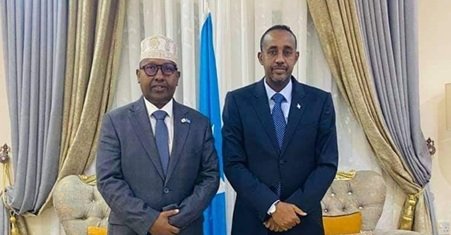By Abdullahi A. Nor
The air in Mogadishu was thick with the scent of salt and diesel, the Indian Ocean’s breeze doing little to cool the simmering tensions inside Villa Somalia. Minister Ahmed Fiqi’s office, a sparse room with faded maps of Somalia’s pre-war borders, had become ground zero for the unfolding drama. Behind his desk, a framed photo of President Hassan Sheikh Mohamud stared blankly ahead, as if bearing silent witness to the minister’s choices.
Former Prime Minister Roble’s request had seemed straightforward. The South Africa meeting, organized by Somali expatriates in Johannesburg, was meant to bridge divides—a symbolic gesture of unity ahead of the nation’s fragile electoral cycle. But symbolism, in Somali politics, was a double-edged sword. To Foreign Minister Fiqi, Roble’s involvement risked legitimizing a man whose political instincts still unnerved the current administration. Rumor had it Roble harbored ambitions of his own, whispered in the discussion circles of Mogadishu’s elite.
The visa letter, stamped and signed, should have taken three days. Instead, it vanished into Nairobi’s bureaucratic maze. Former Education Minister, Hon. Eng. Abdullahi Arab, a man whose engineering precision clashed with the government’s chaos, tracked the document’s trail. “It reached Fiqi’s desk on a Tuesday,” he later told reporters, his fingers tapping the table like a metronome. “By Wednesday, it was ‘under review.’ By Thursday, locked in a drawer. No explanation. Just silence.”
When Roble arrived at Aden Adde International Airport, his delegation in tow, the humiliation was surgical. The immigration officer, a young woman with tired eyes, glanced at his Swedish passport, then at his face, then back at the passport. “Safe travels, Engelis,” she said quietly, using the Somali term for foreigner. The delegation stiffened. Roble’s smile never wavered, but his aide later swore his knuckles turned white around his briefcase.
In Johannesburg, the diaspora crowd erupted in applause when Roble entered the hall. But the cheers carried an undercurrent of unease. Why was he here on a Swedish passport? A woman in the front row, her dirac embroidered with the Somali flag, shouted, “Where is your dignity, Prime Minister?” Roble’s speech, carefully worded to avoid direct criticism of Mogadishu, felt like a dance on broken glass.
Back in the capital, Fiqi’s future-dated visa letter became a punchline. Late-night radio hosts joked about “Fiqi Time”—a mythical calendar where political opponents were banished to 2026. But the laughter was brittle. Older Somalis, those who’d survived Siad Barre’s regime and the warlord era, recognized the tactic. “This is how they erase you,” muttered a grizzled taxi driver idling near the palace. “First your papers, then your name.”
The president’s silence spoke volumes. Mohamud, a shrewd tactician who’d outmaneuvered rivals for decades, let Fiqi absorb the backlash. Some speculated he was testing loyalties; others thought he’d orchestrated the snub to weaken Roble’s influence among the diaspora, whose billions in remittances kept Somalia afloat.
By week’s end, the incident had bled into Somalia’s art. A popular hees singer released a ballad titled “The Passport and the Pen,” likening Fiqi to a “scribe who lost his ink.” Street artists stenciled Roble’s face onto murals beside the word Xor—freedom—a nod to his Swedish ties. The diaspora, meanwhile, seethed. In Minneapolis, a coalition of Somali elders announced a fundraiser to “buy Roble a Somali passport.” The gesture was symbolic, but symbols, as always, cut deep.
In the dim glow of his hotel room, Roble stared at his Swedish passport splayed open on the desk. The navy-blue cover felt alien here, in a room smelling of jasmine tea and Johannesburg rain. His phone buzzed—a message from an unknown number: “They fear your shadow, not your hand.” He deleted it, but the words lingered.
The true cost of the snub, though, wasn’t personal. It was the precedent. If a former prime minister could be stripped of diplomatic courtesies, what of ministers? Mayors? Teachers? The message was clear: loyalty to the state began after loyalty to those who controlled it.
Abdullahi A. Nor
Email: abdulahinor231@gmail.com


Leave a Reply